
Colin Busch is a dangerous man. His words, imbued with a relentless optimism and bounding energy, somehow wend their way deep into your subconscious past your best defenses, the hell hounds named "I can't", "I shouldn't" and "What If", to enter that space where old dreams long forgotten slumber undisturbed under layers of dust.
"Just go. It's easier than you think." he says infectiously.
A few years ago, Colin got his passport, international drivers license and some innoculations and with virtually no further planning, no plan, and no Spanish language skills, he rode South. He continued to ride for 11 months reaching Ushuaia, Argentina, the Southernmost point in the western hemisphere reachable by road. Some months ago, Colin gave part I of his presentation at Bob's BMW which I wrote about back then.
When I saw that Bob's was hosting Part II, it was clear that I had to go.
They described this presentation as "For this viewing, in addition to giving a stunningphotographic overviewof his incredible ride through Mexico, Central and South America, this installment will focus more on the logistical and technical aspects of the how, what, why, when of not just surviving, but thoroughly enjoying long distance world travel on a shoestring budget."
We went up as a group and unlike the previous presentation, this second one drew in a much bigger crowd. The parking lot was pretty full for an early March day.
Colin's adventure bike was not in the lot. There's a photo of it in the previous article I wrote. I talked to him briefly wondering why his bike wasn't here. "Well, I wanted to change the handlebar and I noticed the master cylinder was leaking, so now the bike is completely disassembled for a rebuild." he joked. It happens.
This bike in the parking lot caught my attention.
I notice that there is a virtually identical bike in Colin's flicker feed so I suspect this may very well be one of his.
Bob's goes out of it's way to host presentations from a wide range of people from professional authors to world travellers and others. In this way, it goes from being just a dealership to becoming a gateway drug to a much wider world, one that one would normally never has any easy access to. Depending on the expected turnout, they set up in the showroom. I've also seen them clear out the shop and host presentations in that space. Coffee and donuts are usually available and there's very little if any sales pressure. The no pressure environment makes it comfortable to attend and much more likely that people will come back. It honestly feels like they are giving something genuine to the community and I consider myself privileged to live so close to them. There are motorcycles and stuff which is easy to get, but having access to and gaining inspiration from those who are truly passionate about the sport is something much less common in my experience.
They had set up a projector where Colin presented a slideshow of beautiful photos from his trip and told stories of his experiences. While the previous presentation of more of an overview of the whole trip, this one focused a bit more on the logistical challenges and border crossings. It was not, however, technical being instead more philosophical and as such was enjoyable for those who had not seen part I.
Much of what he spoke about echoed my own experiences heading up to Deadhorse. So many people thought I was going to hurt myself or worse taking a street bike up the Dalton. For some reason, that trip did not scare me. It was the beautiful civilized North filled with Nice People and fierce wild animals.
We've all heard the horror stories of travelling through South America. We hear how dangerous it is. The drug cartels and political unrest are rampant. There are stories of people visiting who just go missing. We've all heard how impassable the roads are and how backwards everything is.
What makes Colin dangerous is that he is proof positive that many of these stories are exaggerated or taken out of context. We here, in the DC area, live next to one of the most dangerous cities in the world and think nothing of it. There have been shootouts on my little street here in College Park, a few blocks down, and I hardly give it any thought. But, thinking about going through Mexico, Central America and South America actively scares me. The Unknown is often scary if you let it be.
He's heard all the same stories that I have. He mentioned that in each country as he approached the border they would tell him, "It's so dangerous on the other side, be careful." And in each case, he found largely the same friendly people where ever he went.
He talked about getting shaken down by police but having it be a non-issue, as long as you have the right attitude. He talked about having to improvise and be creative to get the necessary paperwork to cross various borders. The need for flexibility was a theme that was woven through his presentation. "It was so easy." he said. I remember how I thought the Dalton was easy, but I gave the road the time it needs. Many people I met up there had crashed or had ridden with ones who did. Over time a theme developed that those who were trying to ride by deadline instead of riding the road in front of them were more likely to crash.
"I don't ride at night. If you need to be at place X at a certain time and it's hundreds of miles away, that's when you make mistakes." Deadlines when travelling over unfamiliar terrain can kill you.
The other thing that struck me about how Colin dealt with the various challenges he encountered was how he approached everything with a certain flexibility and open mindedness. I suspect in the same circumstances I would have a much harder time not doing everything by the book. It's a personality trait and one that I will spend some time thinking about. He tells a story of not wanting to spend thousands of dollars to get across Columbia "the right way" so he charters a fishing boat and has his bike loaded up on a little runabout and then hoisted on a moderate sized vessel. The captain dropped him and his bike off in Columbia at which point we was arrested and spent two days confined, but well fed. "They just want to know you're not selling drugs." he explained as if it was no big deal at all. I imagine if the same thing happened to me, I would be traumatized and that trauma itself would cause my captors to react differently to me. All you ever hear is that the Columbians will lock you up indefinitely. He said that after two days, they let him go and pointed him to inexpensive nice hotels he could stay at.
There is a parallel to these stories and what I've spent so much time practicing when riding a motorcycle. Inevitably, when riding there will be these moments where Bad Things(tm) happen. You come into a corner too fast. There's gravel in your path. A deer surprises you. In my experience, it's your stress reaction to these events that's the most likely reason for a crash. If you can remain calm and avoid the tension that will cause you to fixate and crash, you can handle situations that others would be convinced cannot be avoided and you can do so easily. But it's also more than that. There's the background stress of expectations. If you have a deadline, if you feel pressure to make miles, are worried about money, are worried what others think, that stress will also force you out of the calm and prevent you from calmly seeing opportunities in front of you.
I've practiced this so much on the motorcycle, but when it comes to my broader life I fail at this miserably. I can ride a motorcycle present but I make every newbie travellers mistake in the rest of my life. I don't treat it as a journey and I don't simply stop to appreciatively take in the moments and people around me. I hate it that intellectually I know this lesson, I've learned it before, but in practice I keep making the same mistake over and over again and it's cost me so much; lost friendships and ruined relationships. Once again, years later, I find myself saying "I'm sorry." Eventually the words lose their meaning and simply the lesson has to be learned or one is doomed to repeat the mistakes again and again, as I 've been doing.
It's when you have the most to lose, when the bike is sliding out to the corner towards the steep drop off, that is when you have to force yourself to be calm so that you can recover. Stress out, be distracted, be rushed, be not entirely present and you will run wide and crash. This is much easier said than done, obviously. The stress, the panic, it blinds and takes over your consciousness to the point that it's all you can see. Let these stresses invade when you're trying to negotiate a border crossing in some third world country and I suspect the results you get will reflect that. Colin spoke about how he would manage his body language so to put people at ease. "Smile." he said. "Don't be rushed." "Take your time." "Don't be stressed. It's the stressed guy that stresses other people and has problems."
I suspect it's the little things, the little people skills that some have and others lack, that separate a successful journey from an unsuccessful one; just as in life. I believe that it was easy for Colin. So much of what he said rang true for me. I'm not sure I would have as easy a time simply because I'm not sure I could approach these problems as calmly. But maybe I can learn.
The presentation lasted an hour and there were so many other stories. He had a seal break on him dumping his transmission fluid out. Someone stopped and helped him by hauling him and his bike to a shop where it could be repaired. He broke his frame and once again there were people around to help. Everywhere, seemingly, that he needed help there were helping hands available. That was another core message from his presentation. You can't really be self-sufficient. You have to know how to ask for help and trust that there will be some around you. You can endlessly stress over the what-if's that can happen Out There. This is just another kind of stress that causes you to overload your bike. You try to plan for every contingency by taking every spare part and tool that you can for fear of being stuck only to find you've broken your frame because you hit a pothole and you had too much gear. "Take less. If need be be willing to buy stuff on the road." He actually took very little gear with him and relatively few tools. But this is also where experience comes in. After a few trips and some time on the road you get a sense for the kind of problems you are likely to run into and you plan for those.
There were other stories as well. There were moments of incredible beauty. There were places he described which seemed simply alien.
In the end, he simply said that going on the Big Trips is so much easier than people make it out to be. "If you are in the right headspace." I added silently. As I said, Colin is a dangerous man who can inspire you to go do foolish things that you will remember for a lifetime.
After the presentation he hung out and talked for at least another half hour.
His flicker feed has countless stunning photos from his trip.
He also wrote a blog which you can read here.
He's talking about putting together a workshop and possibly another blog about what I guess I would call improvisational travel. If he does offer those workshops, I'll attend and report back.
?

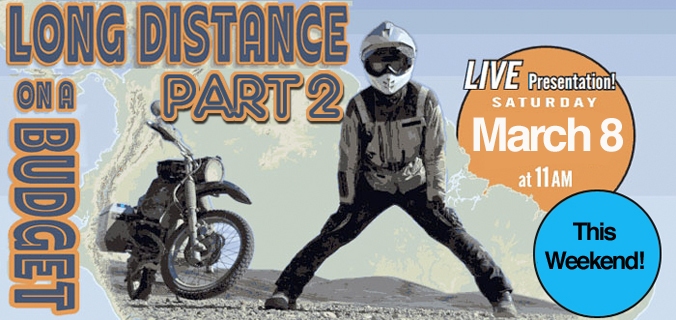
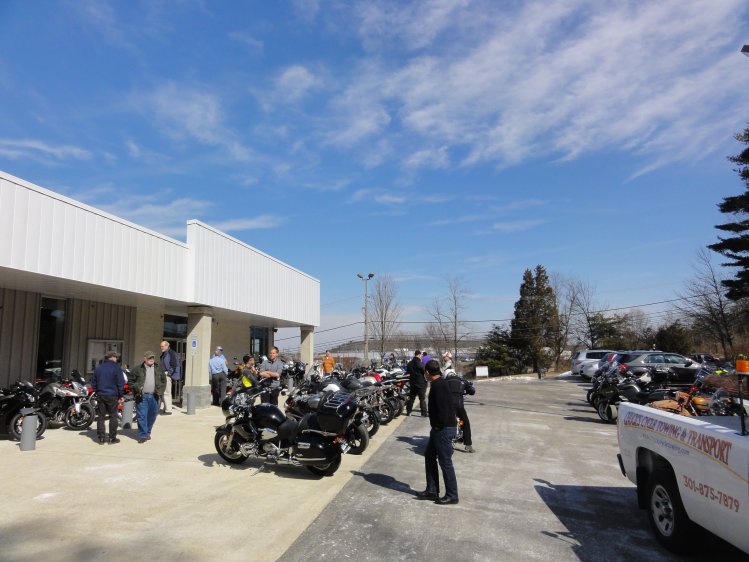
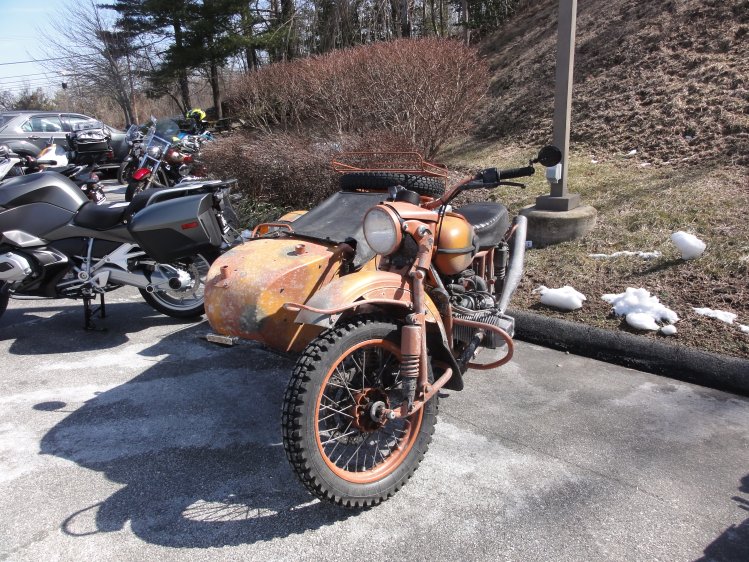
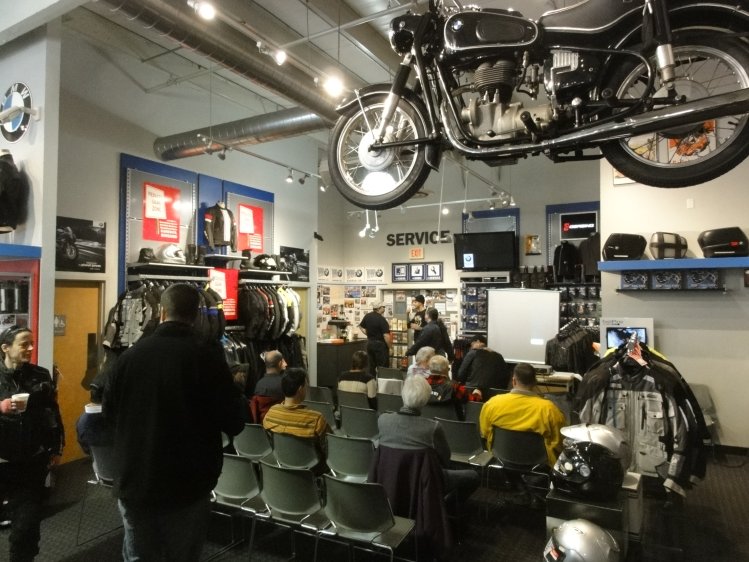
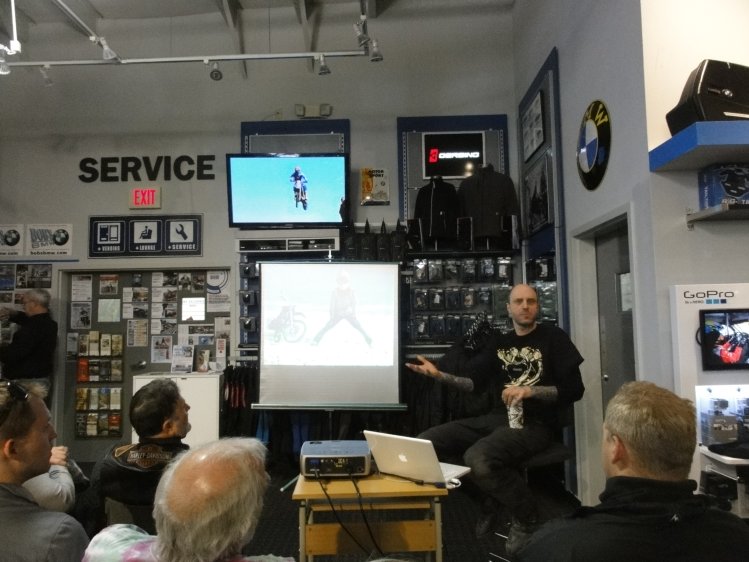
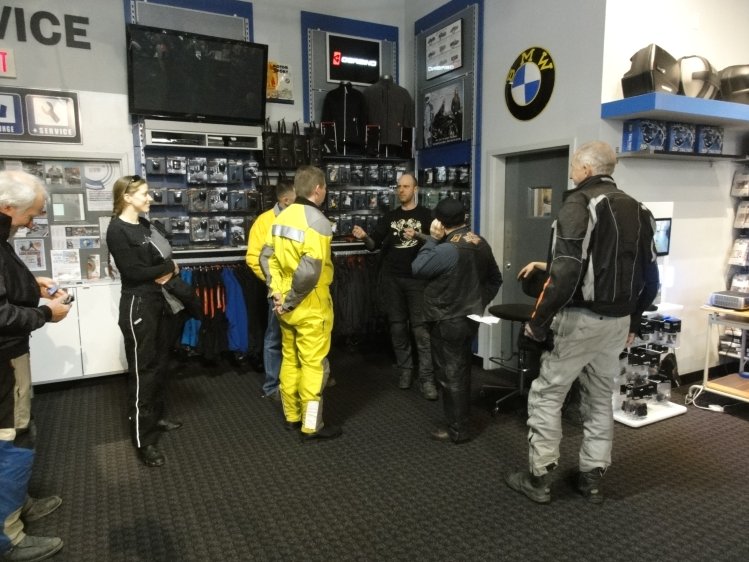
You must be a member of this group to post comments.
Please see the top of the page to join.